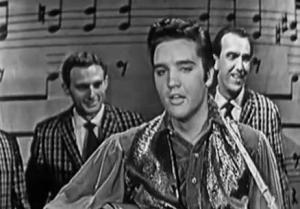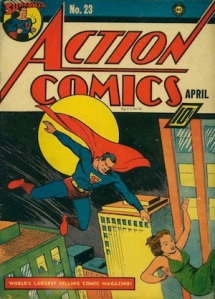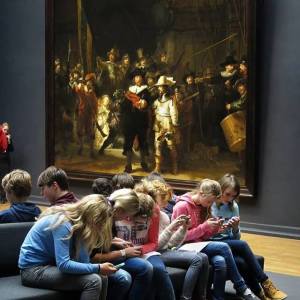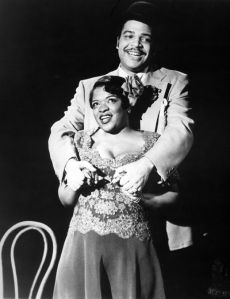If there’s one thing that grinds my gears, it’s the disingenuous concern trolling over the rising generation’s “addiction” to technology, and how it has impacted their ability to [fill in the blank] the way WE DID WHEN WE WERE KIDS AS GOD INTENDED !!11!
Because this is a blog about theatre, I’m going to limit myself to speaking specifically to the outrageous idea that technology prevents the rising generation from appreciating art.
This picture is blowing up my various feeds right now:
This is one brief snapshot. We have no idea what these kids were doing just before or just after. Yet there are approximately 17 shitloads of “tsk tsk” and “This is our future” in my feed. Speaking as someone who has personally witnessed hundreds of high school and college kids blown away by art, I implore you to think more deeply about this.
We’re unthinkingly and unfairly using this picture (and the entire concept of handheld tech) to condemn an entire generation. Think for a moment: were kids enthralled to go to museums in the 1950s? Were kids enraptured by Mozart in the 1960s? Were kids stampeding Joan Didion lectures en masse in the 1970s? What pretend past are we mourning here? Sure, there have always been kids who were enthralled by classical art at an early age (and I was one of them), but the vast majority of kids– and adults– are not. Why are we condemning kids for looking at their phones instead of Rembrandt when most of you would be doing the exact same thing? How long have these kids been on this field trip? How tired are they? How many paintings of white men standing around have they been dragged past? And we dare to use this snapshot to condemn not just them, but their entire generation?
And has anyone bothered to note that this painting is hanging in a museum with an app-guided tour?

Elvis Presley was shot from the waist up when he appeared on the Ed Sullivan show in 1957 to protect teenage girls watching at home from his hip-shaking and its perceived sexuality.
We talk a lot about wanting to engage the rising generation in theatre, and I’m seeing a lot of “what can we do about this?” commentary on this picture. Listen: If you want to engage the rising generation, the first thing you need to do is stop lying to yourself about them. You’ll fail to engage them if you don’t approach them with honesty. You can start by dropping the lie that our generation was any better in any way. Kids can smell dishonesty, and self-congratulation masked as concern is about the most dishonest approach you can take.
This is exactly why 99.999% of “audience engagement strategies” fail miserably to bring in young, diverse audiences. This is why “tweet seats” failed. We’re not looking at this generation honestly. Instead we look at studies designed from the outset to confirm our hypotheses. We make assumptions about how the rising generation thinks and feels based on how they make us think and feel. We refuse to engage them on their own terms, instead dictating the terms to them and then blaming them for boorishness when they fail to meet them.

Gorgeous young Franz Liszt, seen here in an 1839 portrait by Henri Lehmann, inspired a frenzy in his young, usually female, fans, known at the time as “Lisztomania.” Women would wear vials containing his discarded coffee dregs and bracelets made of his broken piano strings. He was chased through the streets by young women attempting to grab a lock of his hair. The older generations were horrified and believed it to be a literal psychological disease.
Young people are no different now than they ever were, and the current pearl-clutching over tech is no different than the worry that comic books would ruin childrens’ minds, reading would make young women hysterical, jazz (and then rock and roll) would turn teens into sex-mad beasts, and television would “rot” children’s minds.

“Badly drawn, badly written, and badly printed – a strain on the young eyes and young nervous systems – the effects of these pulp-paper nightmares is that of a violent stimulant. Their crude blacks and reds spoils a child’s natural sense of colour; their hypodermic injection of sex and murder make the child impatient with better, though quieter, stories. Unless we want a coming generation even more ferocious than the present one, parents and teachers throughout America must band together to break the `comic’ magazine.” – Sterling North, Chicago Daily News, May 8, 1940
There’s no need to fight a battle we’re creating in our own minds. If we don’t look at the rising generation honestly, but instead seek to confirm our own biases about them, we are only going to speak to them in ways they know are dishonest, and get nowhere. Remember how lame older people sounded to us when we were teenagers, and how little they understood about our lives? That’s how we look to kids today when we post stuff like the museum photo above as proof of their lack of worth and how they are, essentially, a problem for older generations to solve.
The rising generation? They are wonderful. They are more politically active than your generation was at the same age. They are more supportive of equality than previous generations. They are brilliant, creative, funny, bold, and bright. And most importantly: They create and consume TONS of art. Whether or not it’s art you like is entirely irrelevant.
Are they perfect? Of course not. But approaching them as a problem to be solved is not going to create the kind of engagement we want. Give them room to speak. It gets us nowhere to tell them what they should be interested in, and then condemn them for their lack of interest. When Ms. Nelson made you read Keats in the 6th grade, and you hated it; when Ms. Sciambi made you look at all those Goya paintings, and you hated it; when Mr. Rodriguez made you listen to Wagner, and you hated it, what did that say about you? When you went home from school and read your D&D Player’s Handbook, listened to Run DMC, and played Dig Dug, what did that say about you? Right, nothing, apart from the fact that you were a normal kid who liked normal kid things.
Yes, we need to expose kids to the arts. We need much much more arts education than we have now. Art saves lives– I believe that. BUT. I was that nerd kid grooving on Keats, Goya, and Wagner in class, and everyone (apart from my nerd clique) gave me no end of shit about it. So now, while the rising generation behaves exactly as you did, you’re talking about how they need to be saved from themselves?
You were fine. They’ll be fine. Keep making art and inviting them. Keep trying– always keep trying. But appreciate them on their own terms. Do not ignore their art, or dismiss it as worthless. And please keep your judgypants in the closet or I will start publishing those pictures of you all from that middle school museum field trip where you were wearing sunglasses and Hammer pants and refusing to look at the paintings that didn’t have naked ladies in them.







